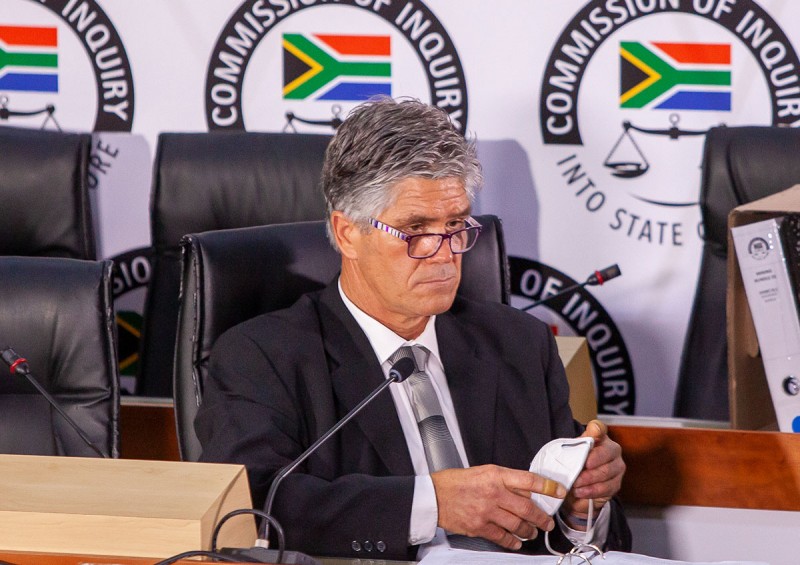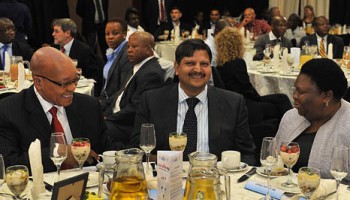The course of South Africa’s Orange River is more than just a scenic marvel. By the time the waterway has swept from the country’s eastern highlands through a vast stretch of scrubland and into the Atlantic Ocean, it has brought along countless diamonds from the mineral clusters scattered along the way.
Local diamond divers near the river’s mouth carry out much of the mining for these precious stones. But the process of extracting, transporting, and selling off the diamonds is firmly under the control of a state-owned mining company called Alexkor.
Anyone able to influence the company behind the scenes would be positioned to reap enormous profits — and, according to the findings of an ongoing investigation, that is exactly what close allies of one of South Africa’s most notoriously corrupt families set out to do.
Drawing on audit reports, auction records, witness testimony, and unpublished documents from an ongoing corruption investigation, OCCRP can show how a company controlled by an ally of the Gupta family was able to game South Africa’s diamond-selling system and manipulate Alexkor’s operations.
Though it has no real track record in the industry, the Gupta-linked company, Scarlet Sky Investments 60, was allowed to auction and sell off what a witness calculated as tens of millions of dollars worth of diamonds from the prized Alexander Bay area at reduced prices to dealers across the world. Some were sold to a company owned by one of Scarlet Sky’s own shareholders, which means he obtained undervalued diamonds he could later resell at market prices.
By systematically undervaluing the diamonds and inviting select bidders to the auctions, Scarlet Sky — which never obtained a trading license — was able to furnish these bidders with cheap stones. In so doing, it contributed to major losses for the state treasury and for the small-scale miners Alexkor pays for the diamonds, many of whom have relied on the industry for generations.
The OCCRP investigation reveals the prices at which those undervalued diamonds were sold, as well as details about how Gupta allies worked behind the scenes to influence Alexkor’s operations and cover their tracks — including a last-minute attempt to legalize Scarlet Sky’s activity through a regulatory sleight-of-hand.
Alexkor did not respond to a set of detailed questions sent by reporters.
Patrick Bond, an economist and professor at the University of the Western Cape School of Government, said that the “uncompensated depletion and mispricing” of non-renewable resources like diamonds was a major reason South Africa had come to be considered among the world’s most unequal societies.
“Diamonds are a classic case, and the modus operandi of Gupta-linked Scarlet Sky Investments gave it enormous influence over a state-owned enterprise, Alexkor,” he told OCCRP.
“The state's shrinkage ... meant little to no control over the supply chain process, with outsourcing to private companies which take away as much as they can, leaving diamond miners, local residents and the ultimate owner of the diamonds — who are, technically, all of us in South Africa — with little to nothing."
The Scandal-Plagued Guptas
Bags of Cash
The Guptas have made previous ventures into the diamond industry. In 2018, an OCCRP investigation showed that the South African subsidiary of Shrenuj Group, once one of India's largest jewelry makers, had received funds allegedly stolen by the Guptas. A few years earlier, the family was also involved in a failed attempt to buy a diamond mine in Lesotho, a landlocked country within South Africa’s borders.
But their dealings with Alexkor, a state-run entity set up in 1992 to mine diamonds along South Africa’s northwest coast, would prove far more extensive.
To exert influence over the company, the Guptas followed a method they’re alleged to have used in previous ventures: Installing compliant officials in state bodies, adding friendly board members, and introducing plans that ultimately work to their or their associates’ advantage. This latest game plan has been laid bare by the ongoing Judicial Commission of Inquiry into Allegations of State Capture. Commonly known as the Zondo Commission, the inquiry is reaching primetime audiences in South Africa as it investigates alleged theft of state resources that stretched over nearly two decades.
Peter Bishop, a senior investigator for the Commission, reported that the Guptas’ involvement with Alexkor began in late 2010, when a politician named Malusi Gigaba was appointed South Africa’s public enterprises minister. Gigaba would later be publicly linked to the Guptas, with his estranged wife alleging during the Commission that he received bags of cash every time the couple visited the family compound.
In 2011, Alexkor joined with the Richtersveld Mining Company (RMC), a local firm representing the diamond miners in the Alexander Bay area, to create a joint venture known as the Pooling and Sharing Joint Venture (PSJV).
After becoming minister, Gigaba set Alexkor in a new direction, directing the diamond company to diversify into coal and lime. A man named Mervyn Carstens was appointed as the PSJV’s CEO in August 2012, and Gigaba appointed Rafique Bagus as its chairperson the following month.
Both men were close contacts of the Guptas and their associates.
According to Bishop, the Zondo Commision investigator, cell phone records show that Bagus spoke to the Gupta brothers Ajay and Rajesh regularly, making 33 calls to them between mid-2015 and early 2016. He also attended the wedding of Vega Gupta, reportedly the Gupta brothers’ niece, at South Africa’s famous Sun City resort. The guest list was studded with South African politicians, and the event became infamous when it was revealed that some attendees arrived on a chartered plane given irregular approval to land at an air force base.
Carstens was also in regular touch with Gupta associates, calling them at least 107 times between 2015 and 2017, according to Bishop.
Suspicious Vehicle Payments
In October 2014, after the two Gupta contacts were installed at its top table, the PSJV started shopping around for a new company to market and sell its diamonds. As reported in South African media, the process to select this new partner was beset with irregularities, including the fact that the contract winner — a company called Scarlet Sky Investments 60 — had no track record in the industry.
Kubentheran Moodley, a politically-connected businessman who owns 60 percent of the company, also had no background in diamonds. What Moodley did have, however, was connections to the Guptas and former President Jacob Zuma. Moodley, a former adviser to the then-Minister of Mineral Resources Mosebenzi Zwane, is known to be an associate of the Gupta family.
In testimony to the Zondo Commission, Gigaba denied all wrongdoing. Contacted for comment, he directed OCCRP to this testimony, in which he noted that knowing the Guptas did not make him complicit in their wrongdoing.
“I have stated repeatedly at this Commission that I had nothing to do with procurement processes in the [state-owned enterprises] and let alone in the department over which I was minister,” he also testified. “I was very far from the supply chain and procurement processes, so I knew nothing about this.”
Reached by email, Bagus denied that he had assisted Scarlet Sky in obtaining the contract or that he had received any instruction or advice from the Guptas and their affiliates to do so.
Asked about the due diligence performed for Scarlet Sky, he said: “In terms of the due process followed, once preferred bidders are selected, it was the responsibility of management to do the necessary due diligence. This was done and reported to the Board of Directors through the Chair of the Tender Committee. The tender evaluation meeting and Board meetings are meticulously minuted and all this information is available in those documents.”
Carstens did not respond to attempts to contact him through his LinkedIn profile. Attempts to reach Moodley by email were unsuccessful.
Undervalued Gems
The owner of the remaining 40 percent of Scarlet Sky was Daniel Nathan, a diamond trader who claims on his website to have over 30 years of experience in the industry.
A postal address provided by Nathan for Scarlet Sky at P.O. Box 333 Melrose Arch was also used by at least two directors of Gupta-controlled companies. In addition, Nathan was apparently linked to the Gupta network through his father, Selwyn Nathan. According to Bishop, Selwyn Nathan was listed as a director of a company called Integrated Capital Management (ICM) in a lease agreement with Trillian Capital, an investment company at the center of the Guptas’ financial network.
Information found on a Trillian server obtained by OCCRP showed further links between Trillian and Scarlet Sky, including documents indicating that Scarlet Sky’s proposal to Alexkor to be reappointed in 2016 was coordinated by Trillian.
In addition, ICM — which would provide “administration and finance” for Scarlet Sky, according to Bishop — was reportedly linked to the Guptas through its affiliation with Salim Essa, who Bishop mentioned several times as a Gupta associate. A 2018 report by the South African amaBhungane investigative outlet quoted Selwyn Nathan’s lawyer as saying Selwyn had introduced Essa to ICM in 2014 as a “credible BEE businessman and potential client,” in a reference to South Africa’s “broad-based black economic empowerment” program.
Daniel Nathan would prove central to Scarlet Sky’s dealings with the PSJV — and to the complaints about their practices that would later come to light.
Early this year, Gavin Craythorne, a local diamond diver and industry activist who felt the Alexander Bay diamond divers were being cheated, testified to the Zondo Commission about their dealings with the PSJV, Scarlet Sky, and Nathan.
Under their agreement with the PSJV, the diamond divers first mine the seabed south of the Orange River and then deliver the resulting gravel to a processing plant operated by the PSJV to extract the diamonds. The PSJV then sorts the diamonds by weight, gives the miner a receipt, and sends the diamonds to auction. The miner receives payment for his diamonds two weeks after they are sold.
The final price of diamonds is typically determined by the “four Cs” — carat, color, clarity, and cut. But Craythorne said the PSJV valued diamonds based only on carat — which refers to the diamonds’ weight — and the number of stones the diver delivered. They did not keep records of the other factors, and did not allow the divers to conduct their own valuations, he said.
Such valuations are not always necessary before the diamonds leave the mining area, Craythorne said, as long as there are safeguards in place to prevent manipulation. For instance, securing the chain of custody as the diamonds travel to the point of sale prevents high-quality diamonds from being swapped out for lower-quality diamonds of the same weight along the way.
Auctioneers can also have independent experts set “reserve prices” — minimum prices for bids under which the diver can choose not to sell — to prevent diamonds from being sold at excessively low rates. Independent audits can also help prevent collusion between the auctioneer and the buyers.
Under Scarlet Sky, Craythorne said, none of these safeguards were in place.
By analyzing auction records, Craythorne estimated that Scarlet Sky undersold Alexkor diamonds by as much as 47 percent during its first year of operation in 2015, as compared with an index used to track international rough diamond prices, known as the Zimnisky rough diamond index. That translates to diamonds with a fair market value of 783 million rand (US$61 million) being sold by Scarlet Sky for just 414 million rand ($32 milion), Craythorne said.
A 2019 government report into Alexkor’s activities, known as the Gobodo report, included prices of diamonds sold by Scarlet Sky. Craythorne said that his analysis of the numbers showed that 30 percent of the lots sold at auction by Scarlet Sky were below the reserve price — in some cases by up to 90 percent.
As the auction host, Scarlet Sky was in a position to determine not only the reserve pricing for these diamonds, but who was able to buy them.
According to an unpublished affidavit submitted to the Zondo Commission and obtained by OCCRP, Daniel Nathan could see the top three bids in these auctions and “could thus share this information with bidders and influence the outcome of the closed bidding process.” Among the buyers were major diamond traders such as JDB Diamonds, Southern Cross Diamonds, and Ernest Blom Diamonds.
OCCRP has found no evidence that Scarlet Sky, Nathan, or the Guptas profited from the undervalued sales.
But experts say that undervaluation in the diamond industry is a common tactic, allowing purchasers to pay lower taxes and other fees in the country of origin and then later sell the diamonds at higher market prices abroad. In many cases, the institution that undervalues the diamonds for the purchasers' benefit would then receive a kickback from the purchaser off the books.
Reached by email for comment, Nathan replied: “I am not going to comment on the contents of your email or any of the questions raised in your email and it would be inappropriate for me or Scarlet Sky Investments 60 (Pty) Ltd to do so. All of these issues have been raised and addressed at length in affidavits that have been filed in the Commission of Enquiry into State Capture.”
The unpublished affidavit also points to another potential source of profits. Only 85 percent of the diamonds were sold at auction. Scarlet Sky was allowed to select five percent of the highest-quality diamonds for “beneficiation,” a process to improve the value of the gem through cutting and polishing. Nathan was personally involved in this process.
The selected diamonds were then bought by another company Nathan owned, Daniel Nathan Trading, suggesting that they could have been purchased at undervalued prices and then sold off at market rates either in rough form or after cutting and polishing.
Another 10 percent of the diamonds were set aside for the State Diamond Trader, a state-run agency set up to sell diamonds on the government’s behalf. Carstens was appointed as the State Diamond Trader’s chairman in 2016 while still serving as CEO of the PSJV — effectively making him both seller and buyer of Alexkor’s diamonds.
The Gobodo report found that Scarlet Sky also sold diamonds to the State Diamond Trader at below the appropriate prices.
Regulatory Sleight-of-Hand
The South African Diamond and Precious Metal Regulator confirmed in a Zondo Commission affidavit that Scarlet Sky has never been issued a diamond trading license — which, if true, would mean all transactions over the course of their appointment were illegal.
With investigations swirling around Scarlet Sky, Nathan attempted a sleight-of-hand maneuver to legalize its activities.
In January 2019, he wrote to the diamond regulator on behalf of Daniel Nathan Trading, saying that the company was changing its name to Alexander Bay Diamond Company and asking for the name of the license holder to be changed. The regulator approved the license under the new name and even backdated the license to March 2015.
But Daniel Nathan Trading did not actually change its name. Instead, Nathan also wrote to a separate agency to request that Scarlet Sky change its name to Alexander Bay Diamond Company, meaning that the license intended for Daniel Nathan Trading in fact went to the now-renamed Scarlet Sky.
The maneuver did not prevent Scarlet Sky’s contract with the PSJV being ended last year. Scarlet Sky is challenging the termination. The South African government has also installed new board members at Alexkor, which is trying to revive its ailing diamond business. The company is technically insolvent and facing a litany of litigation.
Carstens was also suspended from his job as the PSJV’s CEO last year, but later won a 3.2 million rand (about US$220,000) settlement because the process was deemed unfair by South Africa’s Commission for Conciliation, Mediation and Arbitration.
The small-scale diamond miners who claim to have lost out from the dealings have not fared as well.
In the years after Scarlet Sky’s appointment, Craythorne and George Nicolaai — another diamond miner operating in Alexander Bay — decided to blow the whistle on their activities. After going public, both men had their diamond-mining contracts canceled.









